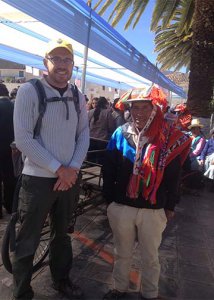HOMESTEAD, Fla. – Trent Blare has spent the last six years as a markets and value chain specialist for entities in Peru and Mexico focusing on small growers.He worked directly with small growers to give them a competitive edge in selling their products to established chains and to developing access to new markets. He did this by conducting research on specific crops traditionally grown in those local markets. That research led to insights on consumer preferences for new crop varieties and uses, innovative and environmentally-conscience sustainable production methods, and enhanced access into various markets
 Blare will lead those same efforts in south Florida as the newest researcher and assistant professor at Tropical Research and Education Center (TREC) of UF’s Institute of Food and Agricultural Sciences (UF//IFAS).
Blare will lead those same efforts in south Florida as the newest researcher and assistant professor at Tropical Research and Education Center (TREC) of UF’s Institute of Food and Agricultural Sciences (UF//IFAS).
“Dr. Trent Blare, is joining TREC at a most opportune time when our growers are desperately searching for new, profitable, alternative enterprises due to foreign competition for many traditional crops, which has left many growers on the verge of going out of business,” said Edward Evans, a professor of food and resource economics and director TREC in Homestead.
“I am very excited about joining TREC and working with growers in South Florida. I am impressed by the growers’ resilience. They have confronted the challenges of crop diseases and growing international competition that has squeezed their margins,” said Blare. “They continue to bring the highest quality product to the market. I see some real opportunities for strengthening markets for current crops as well as introducing new products into the market that have a real potential to enhance farmers’ bottom lines.”
Blare is a natural fit for his research work at TREC having focused his academic career to pursuing a degree in agriculture economics at University of Nebraska-Lincoln, with minors in international agricultural and natural resources, and political science. After volunteering for the Peace Corps in Ecuador, Blare joined UF to pursue his masters and doctoral degrees in food and resource economics specializing in economic development, environmental and ecological economics, agribusiness, and tropical conservation and development.
Because of ever-increasing competition for unbeatable prices, exceptional products, and customer loyalty, companies and growers must continually examine the value they create to retain their competitive edge. Value chain analysis can help a grower find areas of their business methods and production that are inefficient, then implement strategies that will optimize procedures for maximum efficiency, expand market share and profitability. Blare brings this expertise to south Florida’s table.
At a time when consumers are seeking access to locally grown fruits, herbs and vegetables, the future of agriculture requires new and pioneering partnerships between different stakeholders in the food system. For south Florida growers, increased demand for farm to table products means new opportunities when there is access. Making that access available, however, does not happen naturally. It takes a mix of production and natural resource economics.
“There is a market opportunity for growers to align with consumer’s preferences for sustainably- produced commodities,” said Blare. “South Florida is a unique market in that it has the Everglades, Biscayne Bay, the Florida Keys – all areas in need of environmental stewardship. Promoting sustainable production practices has dual benefits for growers that include streamlining costs and opening new doors for profitability while preserving natural resources.”
Blare’s work with the World Agroforestry Centre in Peru examined cocoa, coffee, oil palm, and a tropical fruit native to Peruvian Amazon known as camu camu. Meanwhile, his work at the International Maize and Wheat Improvement Center in Mexico focused on and native maize production. During that time, his research depended on Extension and outreach efforts with local representatives from farmers’ associations, food processors, governmental agencies, restaurants, supermarkets, and consumer groups. Ultimately, Blare’s work successfully strengthened the local food systems while working with growers in obtaining access to global markets and a variety of consumers.
A strategic component of Blare’s new role at TREC is to facilitate policy development at the local and state level to promote agriculture sustainability in the most efficient way that can also preserve natural resources. Blare uses non-market valuation, an economic tool, to determine the value in dollar terms of natural resources like waterways, protected areas, and clean air, that inherently do not have a market value. Establishing these market values for natural resources demonstrates the importance of these natural resources to decision makers and stakeholders.
“Dr. Blare’s expertise in also conducting non-market valuation is timely and will be put to good use as we seek creative ways to compensate the growers for benefits (public goods provided), such as open spaces, carbon sequestration, and wildlife habitats, that help society, the environment, and the agricultural industry,” added Evans. “Such studies will provide evidence-based information that will guide policy decisions for the management of our natural resources for future generations.”
-30-
By: Lourdes Rodriguez, 954-577-6363 office, 954-242-8439 mobile, rodriguezl@ufl.edu
The mission of the University of Florida Institute of Food and Agricultural Sciences (UF/IFAS) is to develop knowledge relevant to agricultural, human, and natural resources and to make that knowledge available to sustain and enhance the quality of human life. With more than a dozen research facilities, 67 county Extension offices, and award-winning students and faculty in the UF College of Agricultural and Life Sciences, UF/IFAS brings science-based solutions to the state’s agricultural and natural resources industries and all Florida residents.
 0
0
